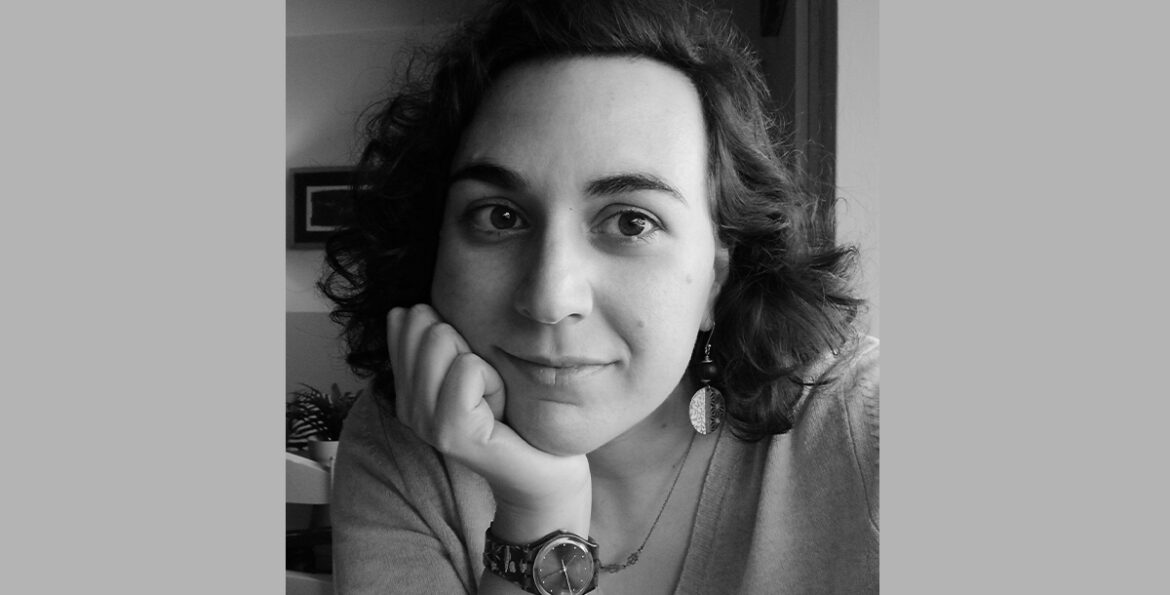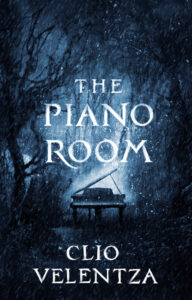
- Home
- Interviews & Blogs
- Clio Velentza Interview

Clio Velentza Interview
- 22nd September 2021
- Category : Interviews & Blogs
Clio Velentza is the author of The Piano Room, a Fairlight Books novel publishing on 30th September 2021. A mysterious and captivating Faustian tale about a man who makes a deal with the devil with unexpected consequences. Read this interview with Clio Velentza to find out what inspired this novel.
 How did you start writing?
How did you start writing?
I wrote my first short story at about nine, which was followed then by a poem and an unfinished play. I wrote fanfiction for a while, but I didn’t get really into writing my own things until I was fifteen. School seemed really restrictive at the time but my evening English lessons became an outlet for creative freedom, and I started turning my essays and vocabulary exercises into stories, much to the surprise of my teachers. This was when writing in the English language became a special place for me, something that I still feel.
I kept on writing through university (where I was studying Chemistry), in an unhurried and self-indulgent way. I had no thought of publication or showing anyone my work, and enjoyed exploring styles and teaching myself as best I could. It was years until I decided to submit something to a contest, and a few more of learning and studying and experimenting until I submitted to a magazine.
What does writing mean to you?
It’s a part of me. Stories, journaling, lists – anything, really. Having pencil and paper close to me makes me feel safe. When I’m not writing for a long time, I’m out of synch with the world and myself. It’s a way of making sense of things, of finding meaning and interconnectedness.
If you could describe The Piano Room in one word, what would it be?
Haunted.
The Piano Room is written in two perspectives – Sandor and Ferdi. Which was your favourite to write?
Sandor’s, since at that early stage the story retains a level of innocence and active exploration alongside the main character. It was also the first that I wrote, since I went about the chronology in a linear way. It was thrilling, and I must admit that I loved returning to the oppressive halls of the Esterhazy manor.
Since so much of Ferdi’s perspective is about confronting trauma and fear, and is a sort of coming-to-life story, it took a lot out of me to get there with Ferdi. I always try to put myself in the character’s shoes and it was an immensely rewarding process as I learned alongside him, but every step of the way required deep diving, which wasn’t always easy. Yet it made me feel closer to Ferdi than to any of the other characters.
The Piano Room is set in Hungary. Why did you find yourself drawn to writing a story set in this location?
Because of the rich, diverse and important musical history and education there: when I realised that I was writing a story about a musician, it seemed like an automatic choice. When I first met Ferdi he was already living in Budapest, so I followed him. A lot of research was involved and I sincerely hope that I did it justice; though of course I took some liberties in the making of a supernatural tale.
What inspired you to write The Piano Room?
The first image was Ferdi’s back, slouching at a ramshackle piano. I knew he was special, but I didn’t know why; I knew there was a dark figure pursuing him, but I had no idea who it was. I wanted to write his story so I could meet him, but then I met Sandor and realised that I needed to take a step back and tell his story too, because it was equally important.
I also wanted to explore themes that had always fascinated me: the legend of the deal with the devil, the creation-versus-creator struggle, and the idea of doppelgangers. And I knew that I wanted to write it in a straightforward, bare sort of way: this is what happened and whom it happened to, and this is what it felt like.
What’s the most surprising thing you’ve learned through writing The Piano Room?
That characters have a will of their own, and you can’t force them to follow a strict path laid out for them back when you still barely knew their hearts. At best, you can guide the story with a firm yet flexible direction in mind. All you can do is be present and listen attentively, so that you’re ready to follow.
What’s your favourite book and who is your favourite author?
Off the top of my head, otherwise I’ll never manage to pick one – a favourite book is Neil Gaiman’s The Ocean At The End Of The Lane, which I reread almost every summer, and a favourite author is Susanna Clarke. I love the way Clarke is able to simply make me believe that magic is only a shift of the mind away.
Do you have a writer’s habit that helps you ‘get in the zone’?
I like to journal before writing, especially if I’m about to dive into a project that’s been long in the making. It helps clear the noise from my mind, chase away the useless doubts, and raise some important questions about the work. I started this habit with The Piano Room and it helped immensely with staying in touch with what was important to me in the story.
I always need a hot beverage next to me (ideally Greek coffee) and classical music. I can’t write or edit in silence, but the music has to be one that directs the flow in a firm yet unobtrusive way. I’ve found that symphonic poems, perhaps because of their inherently narrative nature, are perfect for getting me in the mood. A lot of this book was written to Respighi’s Poema Autunnale and Smetana’s Moldau.
Do you have a writing schedule?
Yes and no. No in that in the long term I follow an ebb and flow: I alternate between writing weeks when I show up and work obsessively, weekends and all, until I complete my goal –followed by stretches of time when I’m not writing at all or very little, and I rest or fill the well.
Yes in that, during the writing days, I follow a schedule where I wake up at a set time, tidy up my workspace, turn off distractions, set aside coffee and a snack and try to do most of the work by the afternoon.
Where do you tend to write?
At my desk when I’m feeling productive, on my armchair when I’m feeling cranky, occasionally at cafés with a notebook and pencil. (I prefer to handwrite most first drafts.) These cafés have to be a safe space: I like a soft buzz of conversation but I need to feel invisible to write.
It’s not always possible to write at home, so I’m constantly on the hunt for the perfect writing café. If it has a quiet mezzanine and a window to look out of unobserved, I’m never leaving.
What do you hope people take away from reading your book?
That they will take their time with the book and enjoy returning to its world; that tenderness is as able to change us as violence; that life may leave questions unanswered but what matters is what we do, what we hope, and how we relate to each other.
What’s a piece of advice you can give to aspiring authors?
Do not give up on finding your audience. Perhaps what you’re writing is not everyone’s cup of tea – and that’s alright. There will always be someone who wants to read exactly the kind of thing you want to write. If your immediate writing environment is not supportive of that, then surround yourself with people who will encourage your own particular weirdness, your voice. Move towards where your work is best appreciated, even if it takes you to unexpected places.
Read more about The Piano Room here.
You can find out more about Clio Velentza here.














